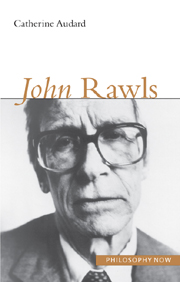Book contents
- Frontmatter
- Contents
- Acknowledgements
- Abbreviations
- Introduction
- 1 The primacy of justice
- 2 Constructing the principles of justice
- 3 Defending democratic equality: The argument from the Original Position
- 4 Pluralism and political consensus: The argument for political liberalism
- 5 A reasonable law of peoples for a real world
- Conclusion: Beyond liberalism
- Notes
- Bibliography
- Index
2 - Constructing the principles of justice
- Frontmatter
- Contents
- Acknowledgements
- Abbreviations
- Introduction
- 1 The primacy of justice
- 2 Constructing the principles of justice
- 3 Defending democratic equality: The argument from the Original Position
- 4 Pluralism and political consensus: The argument for political liberalism
- 5 A reasonable law of peoples for a real world
- Conclusion: Beyond liberalism
- Notes
- Bibliography
- Index
Summary
The natural distribution is neither just or unjust; nor is it just or unjust that persons are born into society at some particular position. These are simply natural facts. What is just or unjust is the way institutions deal with these facts.
(TJ: 87–8)In thischapter, I examine how Rawlstranslateshis moral doctrine of the priority of justice into political principles of justice. The method he uses to that end is political constructivism (PL: Lecture III). Constructivism, as I showed in Chapter 1, is Rawls' specific method, which avoids imposing personal moral criteria to collective guidelines and political principles, asdominant-end or teleological doctrineswould do, thus disregarding citizens' autonomy. Constructivism generates instead from within, so to speak, a transformation of our considered moral intuitions into political principles during a two-stage process. In the first stage, we reconstruct moral intuitions: thisisthe focus of this chapter. In the second stage, we reconstruct the reasoning: thisisthe subject matter of Chapter 3, in which I examine the argument of the Original Position leading to the two principles of justice as fairness as the preferred alternatives. Note, however, that the moral intuitionsand convictionsin question are not apolitical from the start: they are the moral “fixed points” of citizens in a functioning constitutional democracy, a precision that was implicit, but probably not sufficiently stressed in A Theory of Justice, and that iscrucial for the correct understanding of Rawls' project.
In what sense are principles of justice political? I have already noted how a theory of justice may seem far removed from the concerns of real politicsand how difficult it is to establish the connection.
- Type
- Chapter
- Information
- John Rawls , pp. 79 - 122Publisher: Acumen PublishingPrint publication year: 2006



